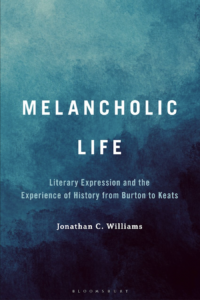 Jonathan Williams’s book, Melancholic Life: Literary Expression and the Experience of History from Burton to Keats, has been published by Bloomsbury Academic (2025). This book charts the long historical process by which the phenomenon of melancholia transformed from a distinctly medical condition (melaina-kole, or “black bile”) to a more straightforwardly political feeling (the kind of apocalyptic agony, for instance, that characterizes some of Benjamin’s or Adorno’s work). It identifies the eighteenth century as a particularly crucial moment in that slow process of definitional transformation. In the hands of writers such as Daniel Defoe, James Thomson, Mary Leapor, Sarah Fielding, Henry Mackenzie, William Cowper, and others, the melancholic body, overcome either by depressive illness or ecstatic reverie, becomes particularly exceptional insofar as it presages the difficult work of social critique. More provocatively, this book argues that in the eighteenth century, the work of melancholic critique assumes a character of minimal efficacy: maximal theorization with minimal praxis. Somewhat ironically, it is that character of minimal efficacy that makes the eighteenth century’s melancholics so critically important: the melancholic might be responsible for only the most minimal of political interventions, but sometimes the most important political work is performed by those who appear to do just barely more than nothing. This book will be of interest not only to eighteenth-centuryists, early modernists, and Romanticists, but also to scholars working in the histories of medicine, emotion, philosophy, religion, and ideology critique.
Jonathan Williams’s book, Melancholic Life: Literary Expression and the Experience of History from Burton to Keats, has been published by Bloomsbury Academic (2025). This book charts the long historical process by which the phenomenon of melancholia transformed from a distinctly medical condition (melaina-kole, or “black bile”) to a more straightforwardly political feeling (the kind of apocalyptic agony, for instance, that characterizes some of Benjamin’s or Adorno’s work). It identifies the eighteenth century as a particularly crucial moment in that slow process of definitional transformation. In the hands of writers such as Daniel Defoe, James Thomson, Mary Leapor, Sarah Fielding, Henry Mackenzie, William Cowper, and others, the melancholic body, overcome either by depressive illness or ecstatic reverie, becomes particularly exceptional insofar as it presages the difficult work of social critique. More provocatively, this book argues that in the eighteenth century, the work of melancholic critique assumes a character of minimal efficacy: maximal theorization with minimal praxis. Somewhat ironically, it is that character of minimal efficacy that makes the eighteenth century’s melancholics so critically important: the melancholic might be responsible for only the most minimal of political interventions, but sometimes the most important political work is performed by those who appear to do just barely more than nothing. This book will be of interest not only to eighteenth-centuryists, early modernists, and Romanticists, but also to scholars working in the histories of medicine, emotion, philosophy, religion, and ideology critique.
